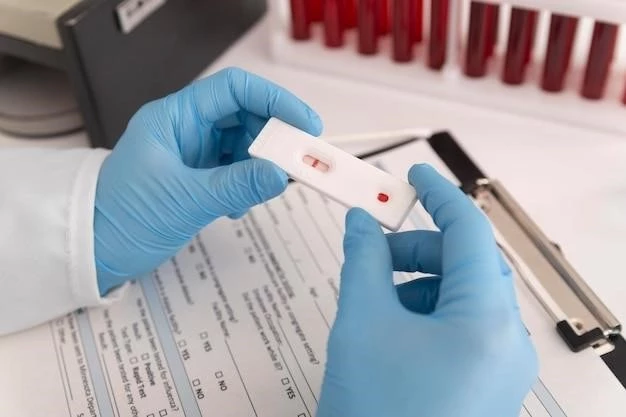Introduction to Refractory Anemia
On the topic of ‘Disease⁚ Refractory anemia‚’ refractory anemia is a condition where the bone marrow does not produce enough healthy red blood cells‚ leading to anemia․ Learn more below․
Definition and Overview
Refractory anemia‚ a condition characterized by insufficient red blood cell production in the bone marrow‚ can result in anemia․ This condition is often challenging to diagnose and manage effectively․ Explore more about the causes‚ symptoms‚ and diagnostic approaches related to refractory anemia․
Causes and Risk Factors
While refractory anemia can arise from various underlying conditions‚ factors like genetic predisposition and environmental influences can contribute to the development of this condition․ Learn more about the risk factors associated with refractory anemia below․
Underlying Conditions Associated with Refractory Anemia
Refractory anemia can be associated with complex underlying conditions such as myelodysplastic syndromes‚ autoimmune disorders‚ and genetic abnormalities affecting iron metabolism․ Understanding these underlying conditions is crucial for the accurate diagnosis and management of refractory anemia․
Types and Variants of Refractory Anemia
Refractory anemia encompasses various forms‚ including iron-refractory iron deficiency anemia (IRIDA) and refractory anemia with ringed sideroblasts․ Each variant presents unique challenges and may require specific approaches for diagnosis and treatment․
Iron-Refactory Iron Deficiency Anemia (IRIDA)
Iron-refractory iron deficiency anemia (IRIDA) is a rare genetic disorder characterized by low red blood cell counts due to insufficient iron absorption and utilization․ Individuals with IRIDA often present with microcytic hypochromic anemia‚ a hallmark of this hereditary condition․
Symptoms and Diagnosis
Anemia symptoms can vary based on severity․ Detecting refractory anemia may involve blood tests‚ bone marrow examination‚ or molecular testing to confirm the diagnosis․ Learn more about the symptoms and diagnostic methods associated with this condition․
Clinical Presentation and Diagnostic Criteria
Recognizing refractory anemia involves assessing symptoms like fatigue and pale skin‚ alongside diagnostic evaluations such as complete blood count tests and bone marrow examinations․ Specific criteria aid in identifying and differentiating refractory anemia from other types of anemias․ Explore more about the clinical presentation and diagnostic criteria related to refractory anemia․

Treatment Options
Effective management of refractory anemia often involves iron chelation therapy to prevent or remove toxic iron accumulations․ In certain cases‚ individuals may require alternative treatments based on their specific condition․ Learn more about the diverse treatment options available for refractory anemia below․
Iron Chelation Therapy and Other Management Approaches
Iron chelation therapy is a key component in managing refractory anemia‚ particularly for patients with iron-loading anemia or hemochromatosis․ Other therapeutic approaches may include phlebotomy for iron removal or targeted treatments addressing specific genetic abnormalities contributing to the condition․ Explore the diverse management strategies available for individuals with refractory anemia․

Prognosis and Complications
Understanding the long-term outlook and potential risks of refractory anemia is essential․ Prognosis may vary based on individual factors and disease progression‚ while complications can arise from chronic anemia and underlying conditions․ Explore more about the prognosis and potential complications associated with refractory anemia․
Long-Term Outlook and Potential Risks
Understanding the long-term prognosis and potential complications associated with refractory anemia is crucial for patient management․ Chronic anemia can lead to various risks‚ and the overall prognosis may be influenced by factors such as disease progression and treatment response․ Learn more about the long-term outlook and potential risks related to refractory anemia․
Research and Advancements
Discover the latest research and advancements in the field of refractory anemia‚ including emerging therapeutic options and ongoing clinical trials․ Stay informed about the cutting-edge developments aimed at improving the management and outcomes for individuals with refractory anemia․
Emerging Therapeutic Options and Clinical Trials
Ongoing clinical trials and research efforts are focusing on novel therapeutic options for refractory anemia․ These advancements aim to address treatment-resistant cases and enhance outcomes for individuals with challenging forms of anemia․ Stay updated on the progress of these emerging therapies and their potential impact on refractory anemia management․
Myelodysplastic Syndromes and Refractory Anemia
The relationship between myelodysplastic syndromes and refractory anemia is intricate and essential to understand for effective diagnosis and treatment․ Explore more about this connection below․
Relationship between MDS and Refractory Anemia
The relationship between myelodysplastic syndromes (MDS) and refractory anemia is crucial to comprehend for accurate diagnosis and management․ Understanding how MDS‚ a group of disorders affecting blood cell production‚ correlates with refractory anemia helps in determining appropriate treatment strategies and predicting outcomes for individuals affected by these conditions․
Conclusion
In conclusion‚ refractory anemia presents a complex clinical scenario where the underlying causes and treatment options require thorough evaluation․ Understanding the relationship between myelodysplastic syndromes and anemia is pivotal for effective management․ Research into emerging therapeutic options offers hope for improved outcomes in individuals with refractory anemia․ Moving forward‚ continued advancements in diagnosis and treatment hold promise for optimizing care for patients with this challenging condition․
